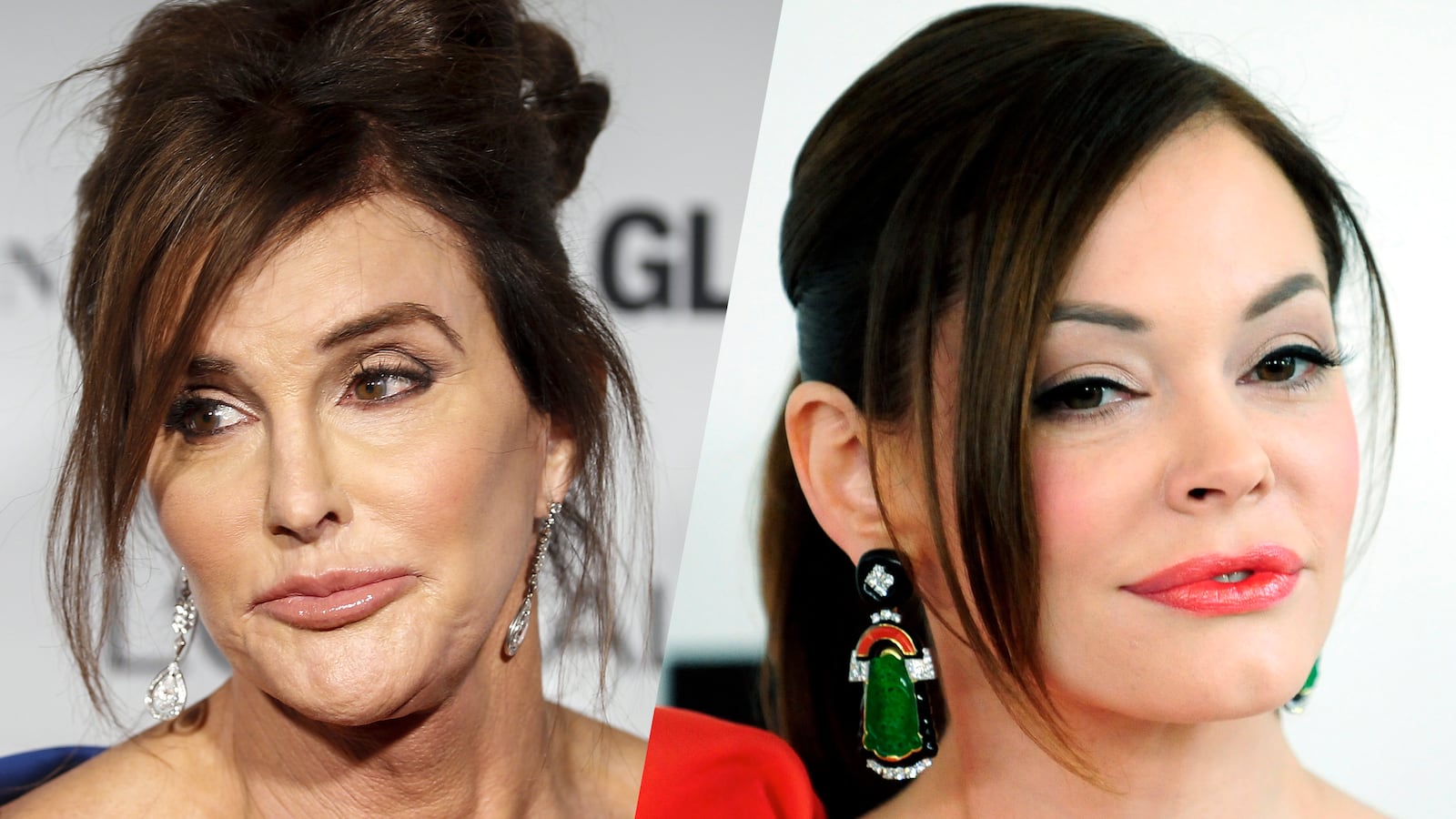Emerging as one of Hollywood’s most radical feminist voices, actress Rose McGowan lashed out at Caitlyn Jenner in a fulminating Facebook post on Monday, after Glamour magazine named her “Woman of the Year.”
McGowan slammed the transgender activist for not understanding “what being a woman is all about.” She was particularly incensed by Jenner’s remarks backstage that the “hardest part about being a woman is figuring out what to wear.”
The Charmed actress interpreted this statement most literally: “We are more than deciding what to wear. We are more than the stereotypes foisted upon us by people like you,” she wrote, echoing second-wave feminists like Andrea Dworkin and Germaine Greer. “You’re a woman now? Well f**cking learn that we have had a VERY different experience than your life of male privilege.”
McGowan has defended her Facebook post in a statement posted to Twitter on Tuesday afternoon: "I am not, nor will I ever be, transphobic...Disliking something a trans person has said is no different than disliking something a man has said or that a woman has said...I'd be thrilled to fight alongside Caitlyn Jenner. I just want her to know there is a monumental fight to be had."
Still, in her original remarks, McGowan has aligned herself with the radical feminist fringe in her rant against Jenner, one of the world’s most well-known transgender woman.
At a time when transgender rights are flourishing in progressive circles, radical feminists will not budge from regarding transgender women as men.
They argue that transgender women haven’t been victims of the patriarchy in the same way that biological women have, particularly women who have fought for decades to defy stereotypes that subordinated them.
There is something off-putting about this exclusionary ideology: It suggests that transgender women haven’t had the same experiences as biological women and therefore shouldn’t be treated as their equals.
We see a similar mentality in sororities, where new members aren’t officially sisters until they’ve endured the same hazing rituals that their elders were forced to endure.
The radical feminists’ message seems to be that yes, transgender women have suffered, but they haven’t suffered for generations like we have.
Needless to say, this doesn’t sit well with today’s progressive feminists, who are so desperate to prove their inclusivity of minority groups that they’re intolerant of any views that don’t entirely align with theirs.
Progressive feminists in the mainstream media were appalled by McGowan’s anti-Jenner rant, which she has since deleted. The Frisky called her out for implying that “every woman’s experience must be that of, say, someone like Rose McGowan, a cis woman who declares feminist politics.”
Caitlyn Jenner has “always been a woman,” they write, “but she was conditioned to present male for all but the last few months of her life.”
As transgender people like Caitlyn Jenner enter the mainstream, we’ve been forced to reconsider what sex and gender mean. Of course, being a man or a woman means different things to different people. For some, it’s an issue of biological essentialism. For others, gender—like sexuality—is not fixed; it isn’t defined by people’s chromosomes but by how they view themselves.
Progressives have taken up the latter position, so that whether transgender people like it or not, they have been politicized as a leftist issue. Meanwhile, old-school, radical feminists find themselves oddly on the same side of the transgender debate as the far-right, who don’t consider transgender people to be “real” women (or men).
Germaine Greer, the 76-year-old trailblazing feminist, has never run in right-wing circles. But her refusal to view Caitlyn Jenner as a woman is a position that conservatives are equally firm on, albeit for different reasons.
In an interview with the BBC denouncing Jenner’s “Woman of the Year” award, Greer argued that “misogyny plays a really big part in all of this, that a man who goes to these lengths to become a woman will be a better woman than someone who is just born a woman.” (You’d be hard-pressed to find a conservative who blames misogyny for Jenner’s “Woman of the Year” award).
The problem with both the older, radical feminists and the younger progressive ones is that they are ideologically exclusive.
Older, second-wave feminists have fought for inclusion their whole lives, but they refuse to take up the transgender cause with mainstream LGBT and feminist movements. Younger, progressive feminists are hell-bent on furthering trans rights even if it means excluding their feminist forebears from the conversation.
They have no qualms banning Germaine Greer from speaking on college campus because of her views on transgender people.
Both camps would do better to adhere less to identity politics and define themselves by more than their genders and sexual identities.





